The great philosopher the Dread Pirate Roberts once opined to the grief-stricken Princess Buttercup that “Life is pain, Highness. Anyone who says differently is selling something.” No one in their right mind would argue with a pirate on that front and certainly not at the tip of a blade or on the edge of a plank. There’s certainly plenty of pain to go around in this world to make that time honoured observation a subject of continuing discourse until the second coming of Christ.
Indeed pain has been a large part of Cheng Shaoshang (aka Niaoniao)’s young life. The pain of growing up without parents and siblings. The pain of neglect and the pain of ill-treatment by self-absorbed, status conscious relatives in a context where male offspring are openly favoured over female ones. It’s at least enough to make a fifteen year old girl a cynical and shrewd observer of the world the adults inhabit. In more recent days, however, pain takes on a whole new level of meaning as Niaoniao is given a glimpse into the devastation that war can bring on the ordinary folk. It makes everything else that she has weathered through in a decade and a half pale into significance. War is misery on a level that she had not known until now.
Love Like the Galaxy which stars Wu Lei and Zhao Lusi as the leads is at its simplest a growing up story. In some ways I am reminded of To Kill a Mockingbird. While the latter is viewed through the lens of an adult reflecting on a childhood that’s firmly rooted in the past, the events of Love Like the Galaxy or 星汉灿烂 are perceived through the eyes of a child who is becoming a woman, thrust into a contradictory world which the adults of her day have built. It is a world which on the surface seems prosperous and peaceful but underneath it are rumblings of discontent with the status quo. It is also a highly stratified society, an implied class system which sees the aristocratic families in uneasy tension with the gentrified military class who are characterized with some degree of contempt by the establishment as the boorish nouveau riche of that society. This tension is played out largely by the young women — the peers of Niaoniao which includes a jun zhu 郡主 (a commandery princess), her chief fawners and the battle-hardened Wan Qiqi. The jun zhu that is highlighted here is of some significance in the narrative because she is betrothed to Wu Lei’s Ling Buyi who will have nothing to do with her but she persists to the point of embarrassment in getting his attention one way or another.
The matriarch of the Cheng family (who are the show’s emotional core) like Mrs Bennet of Pride and Prejudice fame is a silly creature whose main goal in life is to bask in the borrowed achievements of her sons. She lives up to the stereotype of the vulgar rich in her eager ostentatious display of wealth when her oldest son, Cheng Shi is handsomely rewarded for his efforts on battlefield. Old Mrs Cheng favours her sons immensely especially her third son, Cheng Zhi, to the point of snubbing her more accomplished and prestigious first and third daughters-in-law. At one point like Mrs Bennet she brags about her youthful beauty in front of guests who are willing to indulge her for the benefits that association with the wealthy set brings. Old Mrs Cheng is also an individual steeped in tradition and superstition which exacerbates that sense of her as little more than a figure of ridicule.
Much less ridiculous but oddly frustrating is Xiao Yuanyi, mother to Niaoniao and three brothers. On paper the woman should know better: Literate, shrewd and thoughtful. A veteran of many military campaigns alongside her husband. However, when it comes to the raising of her daughter, she seems completely out at sea. No doubt Niaoniao is prone to mischief and her witty sarcasm is not befitting of a young lady of her position but Yuanyi’s panacea for her daughter’s wilful ways cause more (and unnecessary) antagonism between the two than offer corrective solutions. Mother dear is driven by guilt of abandoning her daughter but her parenting methods leave a lot to be desired. The last thing a child who feels utterly let down by the adults in her life needs is more rigidity and the unreasonable imposition of rules especially when the hypocrisies of the grown-ups have been laid bare for all to see.
It is scarcely surprising then that there’s an underlying cynicism that runs right through about the role of the extended family. More often than not households turn into literal battlegrounds for power plays especially among the womenfolk who are ushered into that space not always a result of mutual affection but for long-term social benefits. Afterall parents gets the final say and parents, more often than not, pragmatically decide on the basis of how any potential marriage benefits the family’s prestige than what’s ideal for their child’s long-term flourishing.
There’s a suitor in the wings (there are three in total) for the largely disinterested Niaoniao. He is a renowned scholar in his own right and certainly has read all the right books. Yet the world weariness that afflicts Yuan Shen (Li Yunrui) is striking. Marriage is meaningless to this eligible youngster. He can’t see the point of matrimony when his parents who live under the same roof barely have anything to say to each other. For an intelligent man of marriageable age who craves constant stimulation, the monotony of household interactions must seem like a kind of imprisonment.
The issue of marriage looms large for Niaoniao with three emerging contenders showing an interest. The well-meaning but dull Lou Yao is hot on her heels believing himself to be persistent sure thing rather than what he is - a presumptuous nuisance. However, at this point he is the front runner as the only one who has so far raised the subject unrelentingly. On that basis alone, Niaoniao might say yes because she’s a child desperate for genuine affection that she’s not getting from her mother and it’s a free ticket to get out from under the strict thumb of her mother.
On balance (and in reality) things aren’t that bad for Niaoniao now that most of her immediate family has returned home. Yes, the grandmother was not the ideal role model for a growing lass and neither was the second uncle’s wife, Madam Ge but unlike what her mother thinks, Niaoniao isn’t the self-absorbed, materialistic progeny of those two influences. She does know right from wrong and she understands justice. Despite her mother’s drill-sergeant attempts to refashion her, Niaoniao does have a doting father and at least two brothers that stand up for her. She gets on with her much more placid cousin, Yangyang and finds a kindred spirit in the battle-hardened Wan Qiqi. She’s certainly not as alone in the world as she sometimes believes. For some reason too, the two most eligible bachelors in the country seem to be drawn to her as well. Nevertheless, now that she’s had a taste of war, I imagine that her perspective on what her life’s really like will change somewhat.
On another front is an arms embezzlement scandal with ramifications for national security that sees the trajectory of the leads intersect at various points. General Ling Buyi and his two subordinates are on the job investigating the trail of illegal arms dealers. His relationship with his two sidekicks adds more humour to the piece. The stern Ling Buyi says little, his second-in-command interprets and the third guy is the butt of all the jokes.
This drama has all the hallmarks of being the Next Big Thing. In fact, judging from traffic on the most popular Asian drama platform, it probably already is. The show certainly lives up to the hype. I can see it being a superior product to The Long Ballad. Much of the credit must surely go to the director for bringing together a competent multi-generational cast and working with a cohesive script that’s laser-like in its ability to intertwine a variety of story threads with little danger of derailing. The drama isn’t just artistically appealing but the storytelling with its creative editorial use of camera angles and close-ups makes the world-building immersive and exciting.
The action sequences in this are particularly dazzling. Two recent instances from Episode 12 spring to mind. The director has a penchant for sneak attacks that seemingly come from nowhere as if to accentuate the chaos of the moment. While the scene is focused on a particular character, weapons fly from all directions and land opportunistically where they may. There’s one in particular that involves a halberd which has me reeling with shock and amazement and to my mind, is one of the most stylish displays of the fighting prowess of a lead character in my entire relationship with television. It’s a timely heroic moment in the rescue of helpless civilians at the mercy of unconscionable scoundrels.
Needless to say this drama is a masterclass in visual storytelling. Exposition through dialogue is sparing, on point and done mostly through the happenings captured by the camera. The introduction of the no-nonsense young general is a case in point. The power and the respect he commands is all encapsulated in just those five minutes as he rides in from war surrounded by his army saying only what he has to to the bewildered eunuch who greets him at the city gates.
However my favourite scene has got to be the one where Niaoniao plays Florence Nightingale to the injured Ling Buyi in the most recent twelfth episode. With the horrors of war as its backdrop, the two share a rare moment of intimacy as he fortifies her fraying nerves with gentle words of assurance. On another level it is brimming with sexual tension as the smitten Ling Buyi straddles between the pleasure of being so close to the object of his affections and the pain wrought by the injury. Wu Lei is great in that scene and the chemistry fires but it’s the director’s astute sense of drama that makes this memorable.
12 episodes in, I’m invested. I’m enamoured with the world that Cheng Shaoshang and her loved ones inhabit and judging from the way I’m raiding through the previews, I can’t wait to see what else director Fei Zhenxiang has in store.
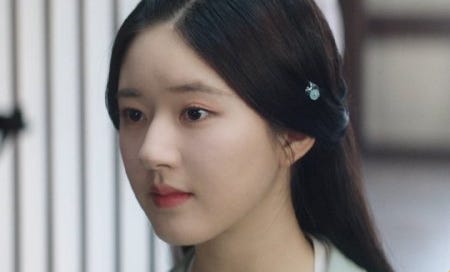



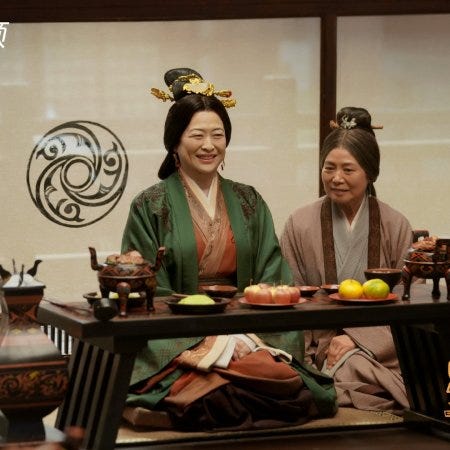
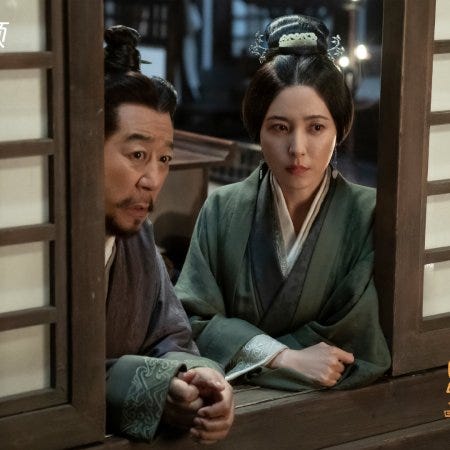
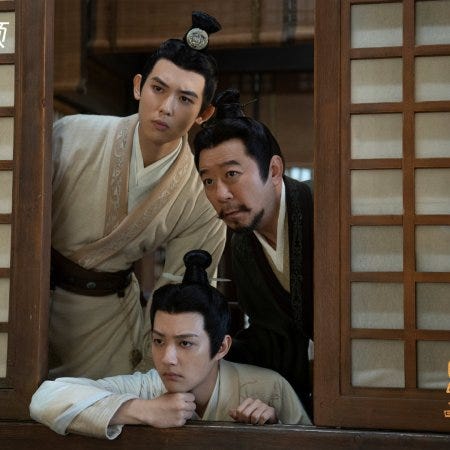
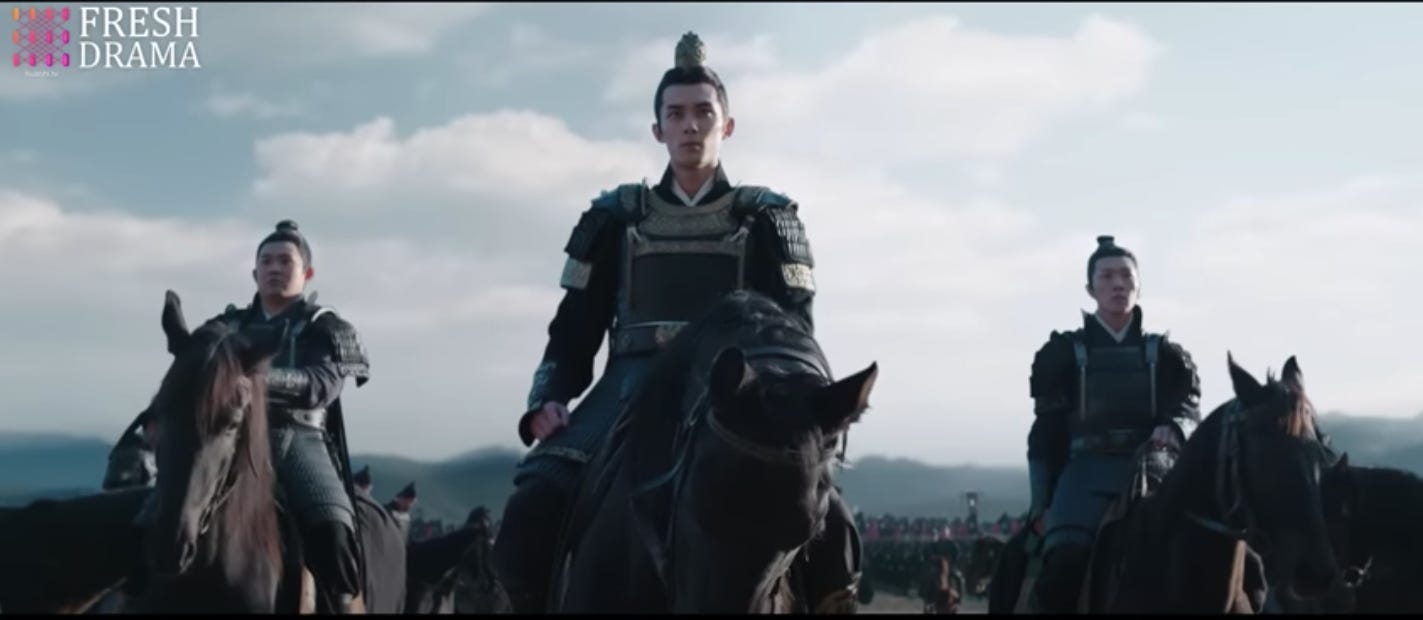
Thank you for this review (at least up to Ep 12) so far!
I also see this as a coming of age story - when two protagonists who are looking to find the meaning of love.
The interviews which the main leads had to explain their characters is a good watch too. I developed a deeper insight into their motives, their feelings and the anticipation of things to come.
I just finished watching all 56 episodes & this was a fantastic movie. Would definitely recommend this to be watched